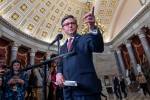Tax foes, even lawmakers, should hire own lawyers
There are slam dunks and there are close calls, and I'm prepared to admit this is more the latter than the former.
But consider this: The very same government agency that drafted the tax bill approved by the 2015 Legislature also offered its services to write a referendum to repeal those taxes.
To me, there's something not quite right about that.
The agency in question is the Legislative Counsel Bureau's legal division. It's comprised of lawyers who write legislation, defend the Legislature in lawsuits and provide legal opinions and research to lawmakers.
Legislative lawyers draft all the bills introduced and passed by the Legislature. That was the case with Senate Bill 483 of the 2015 session, which raises taxes, creates taxes and makes some temporary taxes permanent.
But Assemblyman Jim Wheeler, R-Minden, didn't like SB483, so he asked the Legislative Counsel Bureau's lawyers for help repealing it.
If Wheeler had asked for a bill he could introduce in 2017 to repeal the taxes, there wouldn't be controversy. If he'd asked only for a legal opinion about the mechanics of repealing the taxes (that is, can it be done in a single initiative or does it require multiple petitions?), that wouldn't be a problem, either.
But Wheeler went beyond that in his request. He asked if the Legislature's lawyers would actually draft the language of a repeal initiative. And the Legislature's chief lawyer said yes.
"You have also inquired as to whether we are able to draft the proposed referendum and put it into the correct legal format for filing," Brenda Erdoes wrote in a memo I first reported on back in June. "The answer to this question is that we are able to draft and format the referendum at the request of a currently serving legislator — but just like with the bills and resolutions we draft, you must be responsible for determining whether you believe we have accurately captured your intent in both the provisions of the referendum and the description of the effect of the referendum."
And here's where I think we have a problem.
Drafting legislation, memos and opinions about passing or repealing laws in a legislative session is clearly within the scope of the Legislative Counsel Bureau's duties. But repealing laws by ballot initiative is not. That's a prerogative reserved to citizens and should be undertaken exclusively by them without government assistance.
There are plenty who will argue the Legislature's lawyers are right to assist a sitting lawmaker in drafting the referendum. Their job is to represent lawmakers, after all. (During the 2015 session, they even drafted a bill that Erdoes later opined was unconstitutional, and it wasn't even the first time that's happened!)
Not only that, but the policy of assisting lawmakers with legal drafting has been through plenty of internal discussion and debate over the years. Officials have arrived at the conclusion that they will help any sitting lawmaker, regardless of the content, intent or popularity of his or her idea.
Perhaps I'm wrong about this. Perhaps the professionals in the bureau have it right and did the right thing by helping one of their clients. (Wheeler and fellow anti-taxers would have had to pay big bucks to a competent private lawyer to get a legally sound referendum drafted, after all. And let's not forget the bureau's other clients — a majority of the Legislature — supported the tax bill.)
Perhaps I'm wrong, but the idea of the same government agency helping to write a law and giving advice about its constitutionality, and then turning around to help and advise opponents on how to undo that same law just doesn't seem right.
Steve Sebelius is a Las Vegas Review-Journal political columnist. Follow him on Twitter (@SteveSebelius) or reach him at 702-387-5276 or ssebelius@reviewjournal.com.























